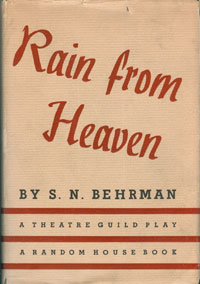|
 |
Rain
from Heaven
S. N. Behrman
New York:
Random House, 1935
First edition in dust jacket
Inscribed by Behrman |
| |
|
(On front free endpaper)
For Young Hovey, / (listening to Bach,
/ March 3, 1935) / from / Sam. / Hollywood, Cal.
Sonya and Carl Hovey’s
bookplate on front pastedown. Carl Hovey was a fellow screenwriter. |
|
| Fired
by Ina Claire’s request to write expressly for her "a
marvelous character like Portia with a grand ‘Quality of
Mercy’ speech" (from which the resultant play devolved its
title), Behrman returned to Broadway in 1934 with Rain
From Heaven. Perhaps it would have received the Pulitzer
Prize as best play of 1934-1935, except that the
liberally-biased dramaturgy did not reflect the isolationist
views held by those with the power to extend the prize. No
less dispiriting to the author must have been Ina Claire’s
rejection of the script. Another of Broadway’s premières
dames du théâtre, Jane Cowl, brought her considerable
eminence to the role of Lady Lael Wyngate. Lael Wyngate’s
English country house is opened to three refugees, two
Russians and one German, plus an American Rhodes scholar
from a Southern state. As all four guests are involved in
one way or another with the arts, they are dismissed as
bohemian baggage by the American tycoon, Hobart Eldredge,
who is in England to assemble an Anglo-American youth force.
Eldredge’s wife, Phoebe, accompanies him as does his younger
brother, Rand, desperately in love with Lael and determined
to marry her. Rand is a "hero" in the Lindbergh image,
having returned from a successful exploration to Antarctica.
The senior Eldredge’s style of fascism clashes continually
with the liberal and balanced ambiance they find in the
English countryside. Decidedly on the defensive, as both
person and hostess, Lael wishes to sustain amiability.
Inflammatory racism is aimed against her German guest, Hugo
Willens – his great-grandmother was a Jewess; thus his
otherwise impeccable Aryan background, in Hobart’s opinion,
became polluted by "this speck" of defilement. In this
polarized atmosphere, Lael cannot remain neutral. She
remains far too sensitive to inhumanity to allow herself to
be intimidated, and she rebukes Eldredge. Encouraged by
Lael’s display of reaffirmation of basic humanitarian
principles, Willens determines to return to Germany to fight
the encroaching menace of Nazism. |
|